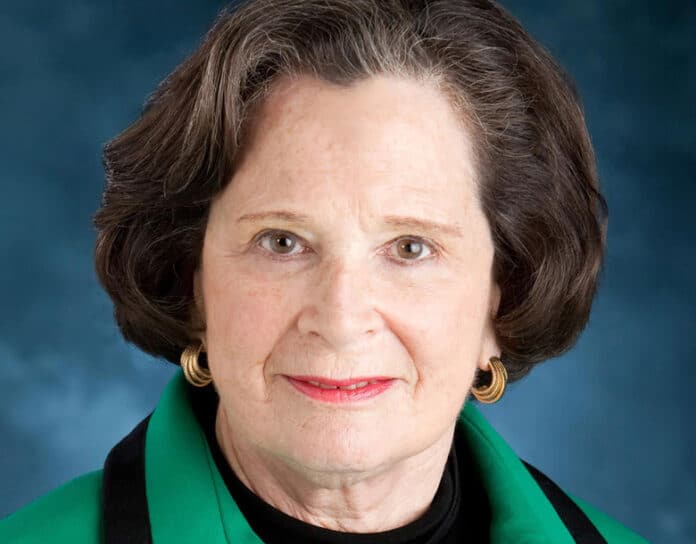Marina von Neumann Whitman, an expert in international trade who in 1972 became the first woman to be appointed to the White House Council of Economic Advisers and who later was one of the few women to join the executive leadership at General Motors, died May 20 in Concord, Massachusetts. She was 90.
Her son, Malcolm Whitman, said her death, in a hospital, was from complications of pneumonia.
Whitman was just 36 when President Richard Nixon nominated her for his three-person economic council, making her the highest-ranking woman in his administration.
“As a woman, she will be outnumbered on the council 2 to 1, but not in terms of brains,” the president said in the Oval Office with Whitman and her family by his side. (The council’s other members at the time were Herbert Stein and Ezra Solomon.)
Whitman was an academic economist by training — she taught at the University of Pittsburgh and later at the University of Michigan — but she alternated her work in the classroom with extensive stints in the public and corporate sectors.
Before joining the Council of Economic Advisers, she had worked for it as a staff economist and then served on the president’s board overseeing price controls.
In 1979, she joined General Motors as a vice president and chief economist. She later rose to become group vice president for public relations, making her one of the highest-ranking women in corporate America at the time.
“One of the things about being an economist is that you seldom get the chance to practice your profession as well as teach,” Whitman said in her own Oval Office comments, following Nixon’s.
She was the daughter of mathematician John von Neumann, a polymath who developed game theory, made critical early advances in computer science and played a central role in the development of the atomic bomb during World War II.
He was one of several Hungarian Jewish emigres who worked on the Manhattan Project — others included Leo Szilard and Edward Teller — who came to be known, jokingly, as the Martians, for their intellectual brilliance and supposedly exotic personalities.
In her 2012 memoir, “The Martian’s Daughter,” Whitman wrote that her father’s immense intellectual accomplishments drove her to excel, especially as a woman in a male-dominated field like economics.
Were it not for him, she wrote, “I might not have pushed myself to such a level of academic achievement or set my sights on a lifelong professional commitment at a time when society made it difficult for a woman to combine a career with family obligations.”
Marina von Neumann was born March 6, 1935, in New York City. Her parents, members of what Whitman called “the Jewish but highly assimilated haute bourgeoisie” of Budapest, had immigrated from Hungary in 1933, after her father received a professorship at the Institute for Advanced Study in Princeton, New Jersey. They divorced when Marina was 2.
Her mother, Mariette (Kovesi) von Neumann, studied economics in college and later worked as the office administrator for a science consortium. After her divorce, she married James Kuper, a physicist who became a department chair at the Brookhaven National Laboratory on Long Island.
Marina spent long stretches living with her father, whose Princeton home became a salon and way station for some of the country’s leading intellectuals.
“I was 15 before I realized this was not the normal American way of life,” she told The New York Times in 1972. The home, she added, was always filled with “terribly interesting people and terribly interesting conversations.”
She studied government at Radcliffe College, now a part of Harvard University, and graduated at the top of her class in 1956.
That same year, she married Robert F. Whitman, who was studying for his doctorate in English at Harvard. He died in 2024. Along with their son, Malcolm, a professor of developmental biology at Harvard, she is survived by her half brother, George H. Kuper, and two grandchildren. Her daughter, Laura M. Whitman, an assistant professor of medicine at Yale University, died in 2023 at 59.
Marina Whitman initially thought of becoming a journalist. But her first job after college, with the Educational Testing Service, ignited an interest in economics.
She wanted to attend Princeton, but at the time, its acclaimed economics department did not accept female graduate students. Instead, she studied at Columbia University.
After receiving her doctorate in 1966, Whitman became a professor at Pittsburgh, where her husband taught English. They took leaves of absence in 1972, when she joined the Council of Economic Advisers, and moved to Washington with some intention of remaining there long-term.
But she resigned after just a year, disillusioned by the Watergate scandal that was beginning to unfold around Nixon.
Back in Pittsburgh, but with a much higher public profile, she joined a number of corporate boards, including those at Procter & Gamble, Alcoa and Manufacturers Hanover, today a part of JPMorgan Chase.
Whitman spent 13 years at General Motors. After she left in 1992, she taught at the University of Michigan’s business and public policy schools.
A lifelong Republican, she did not put herself forward as a feminist. But she did her part to prop open the doors she had gone through, for other women to follow.
“There is a very small group of highly visible women who have now been offered a lot of boards,” Whitman told the Times in 1984. “What has not developed as much as I hoped is going beyond that to a second wave. When I turn down offers, I sometimes have tried to suggest other women, but people do not react well to names they haven’t heard before.”
c.2025 The New York Times Company. This article originally appeared in The New York Times.







